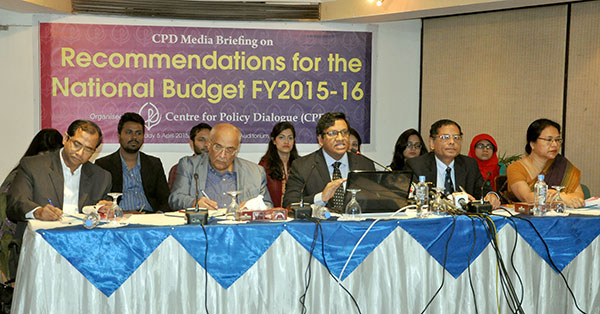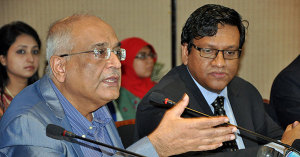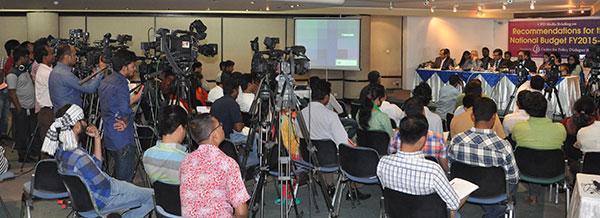As political unrest continues to take a toll on the Bangladesh economy, major sectors have incurred a loss equivalent to Tk. 4900 crore or 0.55 per cent of GDP of FY2015 during January to mid-March this year.
CPD came up with the estimation at a media briefing on its recommendations for the upcoming National Budget for FY2016, held at Brac Centre Inn on 5 April 2015.
The CPD analysis particularly focused on macroeconomic backdrop in the run-up to the upcoming National Budget, economic losses arising from political violence in early 2015, implications of key global developments and IMF’s Extended Credit Facility (ECF) and World Bank’s proposed development support credit, noted CPD Executive Director Professor Mustafizur Rahman.

In his keynote, CPD Research Fellow Mr Towfiqul Islam Khan presented a conservative analysis of economic loss covering major sectors including agriculture, poultry, shrimp, apparels, plastic, transport, tourism, banking & insurance, wholesale & retail trading, real estate and education.
[box type=”info”] ResourcesSurfing in Uncertain Times: An Outlook for the Upcoming Budget [presentation]
Budget Proposal FY2016 [paper]
[/box]He mentioned that despite political deterioration, Bangladesh economy continues to enjoy relative macroeconomic stability in the form of low inflation, manageable fiscal deficit, stable exchange rate and favourable BoP position.
Coupled with the domestic issues, a few negative developments in the global economy could have implications for Bangladesh economy. These include receding remittance flow, falling economic growth in the EU, sluggish demand for Bangladesh RMG products in the US market, significant decrease in export growth and higher appreciation of the BDT against the Euro vis-à-vis Bangladesh’s export competitiveness.
As the National Board of Revenue (NBR) is likely to miss its revenue target according to the CPD analysis, the government must increase revenue generation, particularly in view of the forthcoming pay scale for government employees and assess its fiscal viability, noted Mr Khan.
CPD Distinguished Fellow Dr Debapriya Bhattacharya reiterated that among the persistent shortcomings, private sector investment remained lacklustre for the political environment’s failure to facilitate investment and policy incentives. The downward slide must be improved through inclusive politics.
 He particularly cautioned that without undertaking policy and infrastructural reformations at most government institutions, the economy may continue to stumble in achieving the anticipated growth, which now remains somewhat stalled around six percent.
He particularly cautioned that without undertaking policy and infrastructural reformations at most government institutions, the economy may continue to stumble in achieving the anticipated growth, which now remains somewhat stalled around six percent.
However, expected reform agendas supported by the IMF and World Bank development support credit may curb the government’s autonomy over policy space, noted Dr Bhattacharya. CPD has always maintained that reforms, whilst much-needed, must be domestically-owned and nationally-designed.
Dr Bhattacharya shed light on how, without reformative measures, effectiveness of public private partnership remains doubtful, ADP projects continues amidst mismanagement, banking sector suffers irregularities and district budgets lacks engagement with the local context. He also urged more clarity regarding the import data for suspected anomalies and reformation in the upcoming Seventh Five-year Plan.
Among other specific policy recommendations, the government was urged that the upcoming national budget address the issue of economic losses through appropriate fiscal and budgetary support.
Ms Anisatul Fatema Yousuf, Director, Dialogue and Communication and CPD Additional Research Director Dr Khondaker Golam Moazzem and junior researchers were also present at the briefing, following by a Q&A session with the journalists.


